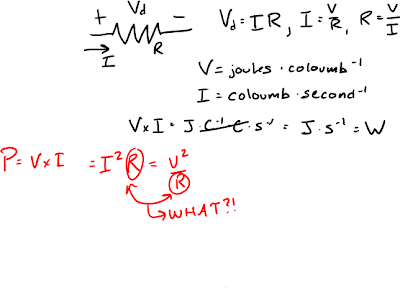I'm finally home for the summer! Sorry for the absence of posts lately, but there was something that caught my mind the other day. Is power proportional to resistance? Naturally, I started jotting down Ohm's Law. For those of you who don't know, check my last post for a rant about Ohm's Law (TL;DR - V=IR).
To find the power dissipated across a resistor (or any Ohmic load) we present the following scenario (please forgive my handwritten notes in advance). The voltage across the resistor is represented in Volts, which is the energy in Joules per unit charge in Coloumbs. Likewise, the current flowing through the resistor in Amperes (A) is the amount of charge (C) per second (s). If we multiply the voltage and current together, the charges cancel out and we obtain that P = VI. If we substitute Ohm's Law into the previous equation we can rewrite the power formula as (I^2)R or (V^2)/R.
 |
| Yes, I showed my work... |
This presents a predicament to me - is dissipated power proportional to resistance or not? There are three possible scenarios.
- The power is proportional to the resistance based on the equation P = (I^2)*R.
- The power is inversely proportional the resistance based on the equation P = (V^2)*R.
- The power is independent of the resistance and is constant for a fixed resistance regardless of voltage and current changes.
 |
Sorry that it's going off the border; I was going for readability.
And the results...
 |
| I suppose it was redundant to plot the same quantity three times. |
Thanks for reading!
~Mike
awesome, thanks!
ReplyDelete